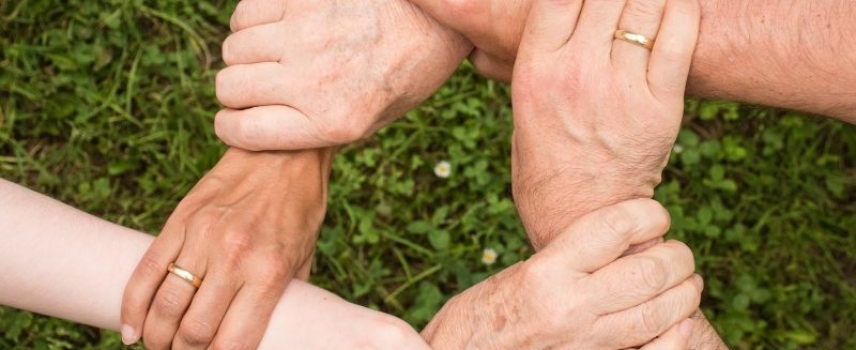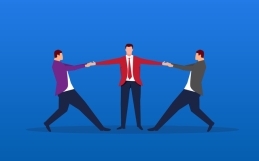“When you go out into the woods, and you look at trees, you see all these different trees. And some of them are bent, and some of them are straight, and some of them are evergreens, and some of them are whatever. And you look at the tree and you allow it. You see why it is the way it is. You sort of understand that it didn’t get enough light, and so it turned that way. And you don’t get all emotional about it. You just allow it. You appreciate the tree.
The minute you get near humans, you lose all that. And you are constantly saying ‘You are too this, or I’m too this.’ That judgment mind comes in. And so I practice turning people into trees. Which means appreciating them just the way they are.”
― Ram Dass
I used to be trapped in a people-pleaser’s nightmare. I was surrounded by people who were never satisfied and always finding something wrong with every situation. I saw the people around me screaming whenever they didn’t feel gratified or didn’t get their way. They were always looking to me to satisfy their discomfort and blaming me for their misfortunes. These last few years I have come to the startling realization that no matter how much I’ve evolved, deep in my heart, I still want to see other people happy. Part of me still feels somewhat responsible for that; I’m uncomfortable with the thought of people being upset with me. But I’ve had ample opportunity to change that about myself, especially since I have contact with people who get upset about mostly everything. “You didn’t say hi the right way.” “Why weren’t you the first to call me on my birthday?” “It’s your fault I’m angry.”
I grew up with a guilt that consumed my soul, and I spent my life seeking ways to prove that I was a good person, a good family member and friend. My driving hope was that one day, everyone in my family would look at me with love, and I would simply be enough. I used to think, “Maybe this time I will have a gathering where no one gets upset.” But it never worked; I always did something. It still hurts to not be fully excepted, but as I’ve gotten older, I’ve decided to make peace with those feelings. I’ve come to realize that other’s dissatisfaction with me isn’t my fault, and if someone is on a mission to be disappointed, they will be—no matter what I do. I had to make the decision to know myself and claim my worth and value apart from what anyone else has to say.
Sometimes I honestly wonder if the path I took to start living my own life was worth it; other days, I dance in the glory of the freedom I’ve claimed to make my own life, even if others aren’t happy with me. Many of my clients have complicated relationships with family. Some of their families are distant, others are smothering, and some are too critical. The truth is, we’re all affected by those closest to us, whether we like it or not. We all want good relationships, and that’s a beautiful thing to cherish. But sometimes we just have to accept the ones we have. I learned that in order to have close relationships with complicated family, I had to first let go of the fantasy. It isn’t fair for me to push others to change so that I can be more comfortable around them. I had to be the one to changes my reaction towards them.
In spite of it all, I can see that every person has amazing qualities. Most complicated people don’t take shit from anyone, they tell you like it is, and though they are usually perpetually dissatisfied, their loyalty knows no bounds. The truth is that the most difficult people have hearts of gold, but a thirst for control that consumes them.
Even though I have complicated relationships at times, I’m grateful for the hardest ones that I do have, because if it wasn’t so painful trying to please those people, I never would have changed. It was so hard to be a people-pleaser in my most important relationships, that it pushed me to be a better version of myself. Sometimes our teachers aren’t the people we expect them to be. The difficult people in your life will be your greatest teachers, as well as your most challenging relationships.
The biggest lesson I learned is that I’m not responsible for another person’s happiness, and it’s okay to upset people if you’re doing what’s right for you. I know this made me a stronger person, because if I can live with dissatisfying the ones I love, I can live with upsetting just about anyone. If you’re struggling like I have, here are some things you can do about it.
1. Say goodbye to your fantasy relationships. If you have complicated relationships with family or wish things could be different between you, I understand how frustrating and confusing that can be. However, if you want to maintain a relationship with your loved ones, it’s important that you throw away your fantasy of who they should be, and accept them as they are. If you’re lucky, you can utilize those relationships to change things about yourself that will help you in other areas of your life.
2. Understand others in their context. I learned that the most difficult people are still struggling with their own personal issues. If their issues don’t get resolved in a family, those patterns will continue into the next generation. No matter how difficult it is, I will work on my family relationships, learning to accept the family I’ve got, and keeping in check my need to please others.
3. Remain connected, even when you’re upset. Trust me, I know how hard it is to remain connected with someone when you’re upset. But we have to remember that a family is an emotional unit. What one person in a family does affects everyone else. I made a decision to never cut family out of my life, no matter how hard it gets at times. I take each time someone gets upset with me as an opportunity to express myself and learn how to deal with confrontation. Even though I’m not my former people-pleasing self, I don’t have conflict with too many people. Through my family relationships, I can continue learning how to deal and manage when there’s conflict.
4. Give yourself time to respond and not react. When we’re emotionally charged, our initial reaction is to either retreat or yell back. But it’s helpful to practice responding instead. I don’t like distancing from people I care about, and I also don’t like yelling and screaming. I’ve learned that it’s okay to be firm and speak your mind. When you’re triggered by someone else, give yourself a little time to cool off, but always make it a point to discuss what is and isn’t okay with you. Use your response as an opportunity to show who you are and make clear how you handle difficult situations.
Yes, I get upset. Yes, I sometimes wish it was easier. But most of the time in life, we don’t get the relationships we want; we get the ones we need—the ones that will challenge us to our core. We can run from them, but nothing gets solved that way. I’ve come to realize that if people want to get angry at the small stuff, that’s not my problem. I have to remember to be okay with others being upset, especially when there isn’t anything I can do about it. I have to learn that I can’t please everyone, and it’s okay to keep doing what’s right for me.
Did you enjoy reading this article?
Once a week I send out a newsletter with new articles and unique content for readers. It is my way of staying in touch with you and giving you free advice based on some important topics.
Click here to sign up for my newsletter.
Have a tough time putting yourself first? Still not sure how to take action to live the life you always dreamed of? Check out my latest book, “When It’s Never About You.” – http://amzn.to/2macaur
Talk soon,
Dr. Ilene





My birth family didn’t accept me. The children I gave birth to were very close to me and to each other for a very long time. Two of my birth family are self-righteous and make intentional steps to come against me even now after 35 yrs. I don’t want them in my life. However, they descended on my grown kids at vulnerable times in their lives, have loaded them with lies. My son has been pushing me away for over 3 years, and then I heard him quietly say he didn’t love me anymore.
It would be helpful to me and millions of other parents with grown children estranged from them. The pain I’ve been through affected my health and life. At 69 I have to make a new start without my precious children – I’ve never seen my grandchildren. My ex=husband who left us for another woman when my kids were little, tore us apart. Now my family is “drawn and quartered”. I’m on my own entirely. I’d love to see helps regarding a family that can’t mend without divine intervention. I’m brokenhearted every day. Health problems hold me back from interacting with people and I’m afraid to move forward, not knowing how to make decisions about changing my life. In my heart it’s like separating myself from my kids. It feels permanent and robs me of hope.
Very insightful! Thank you very much. I look forward to getting more articles on family dynamics.
When family has been sexually, emotionally and physically abusive I have no issue with cutting them off. It is not my job to fix them. In the human body, if there is gangrene, we amputate the affected limb to save the rest of the body. The abusers are the gamgrene and needed amputation. Please don’t attempt to shame people into staying in unhealthy relationships with awful people to maintain the “family”. Sometimes they have to amputate to save themselves and that is the healthiest thing to do.
I am sorry that wasn’t my intention to shame people to stay in unhealthy relationships. This article was addressing less serious family drama. I do believe maintaining family relationships is important, though every situation is different. I was not talking about people who are being abused by family. That is a different topic and conversation, better reserved for therapy.